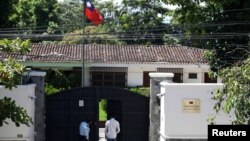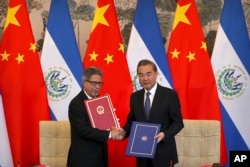El Salvador is denying asking Taiwan for large sums of money in return for maintaining diplomatic relations with Taipei, before Tuesday switching ties to China.
In an interview with state television Tuesday, presidential spokesman Roberto Lorenzana called Taiwan's allegations "totally false.''
Lorenzana said the decision to break ties with Taiwan and switch allegiance to China was based on the advantages of trading with an economic giant.
Taiwanese Foreign Minister Joseph Wu had accused El Salvador of continuously asking for funding for a port development project that Taipei felt was financially unsustainable. He said the denial of funds is what led San Salvador to abandon its partner of more than 80 years.
El Salvador's foreign minister, Carlos Castaneda, signed an agreement with his Chinese counterpart, Wang Yi, during a ceremony in the Chinese capital. Yi said the people of El Salvador will enjoy tangible benefits from the new bilateral relationship.
In a speech announcing the diplomatic switch, El Salvador President Salvador Sanchez Ceren said his government was certain "it was a step in the right direction" that corresponds to "the inevitable trends of our time."
The move prompted the U.S. ambassador to El Salvador, Jean Manes, to tweet late Monday that the decision "is worrisome for many reasons'' and "without doubt, this will impact our relationship with the (Salvadoran) government.''
The United States formally recognizes only China, but it maintains a de facto embassy known as the American Institute in Taiwan.
China considers Taiwan a renegade province and refuses to recognize its right to exist as a self-governing state.
Abandoning Taiwan
El Salvador is the third nation to abandon Taiwan for China this year, following on the heels of the Dominican Republic and the West African nation of Burkina Faso, leaving just 17 small, poor countries to recognize Taiwan as a sovereign nation.
Taiwanese President Tsai Ing-we vowed that the island would not cave to pressure during a press conference Tuesday in response to the diplomatic switch, saying Taiwan was more determined to preserve its self-rule.
China and Taiwan split in 1949 after Chaing Kai-shek's Nationalist forces were driven off the mainland by Mao Zedong's communists and sought refuge on the island of Taiwan. Beijing considers the island a renegade province that should be reunified with the mainland — by force, if necessary.
China has ramped up efforts to cut Taiwan off from the rest of the world since Tsai Ing-we, the leader of the pro-democracy Democratic Progressive Party, took office in 2016 and refused to accept the long-standing "one China" principle.
Two other nations, Sao Tome and Principe and Panama, have switched their diplomatic relations to Beijing during Tsai's tenure, and Beijing has successfully blocked Taipei from participating in various global forums and agencies.
It recently pressured dozens of international air carriers to either switch references of Taiwan to "Taiwan, China," or remove Taiwan from the results of its destination searches, using the island's capital instead.






